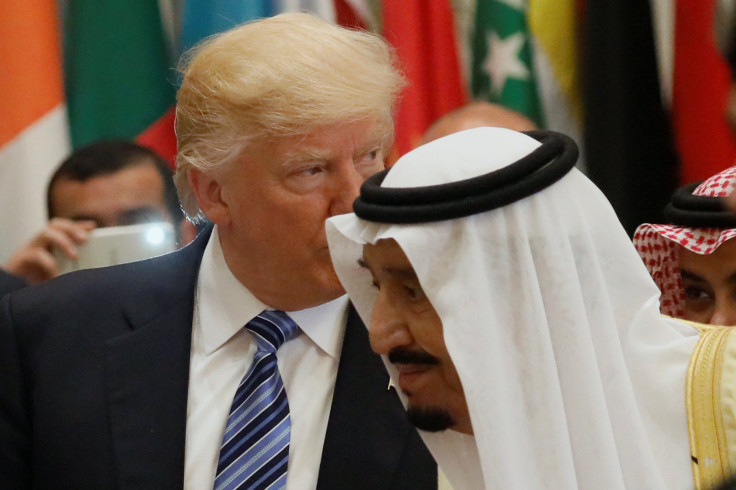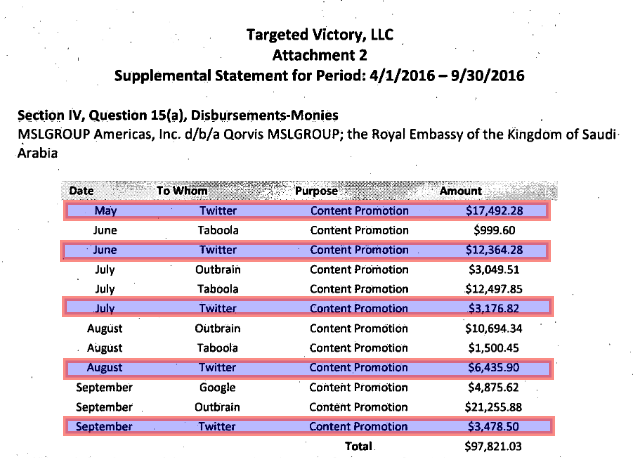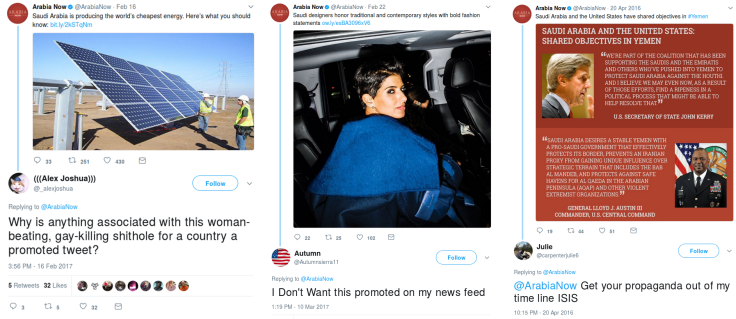Did Saudi Arabia Pay A PR Firm $1 Million For 55 Tweets?

Saudi Arabia’s long-standing public relations campaign in the U.S. has sought to oppose the Justice Against Sponsors of Terrorism Act, paint neighboring Qatar as a funder of terrorism, and generally portray the kingdom in as positive a light as possible. One such effort by the Saudi Embassy is the website Arabia Now, which highlights Saudi Arabia’s efforts in counter-terrorism, women’s empowerment, innovation and green technology. An International Business Times review of filings with the Departments of Justice shows that D.C. communications consulting firm Targeted Victory was paid over $1 million to write 55 tweets and create advertising campaigns on behalf of Arabia Now’s associated Twitter account.
The Arabia Now website is run by another D.C. consulting firm, Qorvis Communications, according to its most recent activities filing in the DoJ’s Foreign Agents Registration Act (FARA) database. As part of that work, Qorvis manages the @ArabiaNow Twitter account, regularly posting articles from the website.
Targeted Victory has taken on a specialized subset of the work as a subcontractor of Qorvis, handling paid social media promotion of the website. The firm’s initial engagement document with Saudi Arabia, from 2015, states that “Targeted Victory, on behalf of Qorvis, will provide strategic advice and digital consulting services for the Royal Embassy of the Kingdom of Saudi Arabia.”
For that work, from April 2015 through March 2017, Targeted Victory was paid $1,045,500 by the Saudi embassy. They wrote 55 tweets, which were then turned into advertisements through Twitter's promoted tweets system.

Targeted Victory was founded by Zac Moffat, a former Republican National Committee strategist and the digital director for Mitt Romney’s failed 2012 presidential campaign. One of the three Targeted Victory consultants working on the embassy’s account, Rebecca Heisler, worked for both Romney’s 2008 and 2012 campaigns; in the 2012 campaign, she ran the former Massachusetts governor’s social media.
Targeted Victory and Heisler did not respond to multiple requests for comment from International Business Times.
In addition to writing and creating an advertising campaign for those 55 tweets, Targeted Victory managed analytics reporting and handled advertising through other platforms including Google, Microsoft, and Outbrain. But Twitter was the largest recipient of advertising dollars. In total, Targeted Victory spent $142,406.70 on promoted tweets over the two year period.

It is possible that Targeted Victory completed other tasks on behalf of the Saudi Kingdom, but if so, that work was not explicitly disclosed in the agency's required FARA filings.
Targeted Victory’s website advertises the agency as being able “to create strategic plan and effectively deliver the right messages to move the needle.” Indeed, Targeted Victory’s FARA filings state that it provided digital consulting services to Saudi Arabia that "involved relevant outreach to targeted sectors of the U.S. public." That expertise in digital targeting, which the Saudi embassy is paying a premium for, appears to not have paid many dividends. Responses to the promoted tweets written by Targeted Victory were almost universally negative and dismissive, despite Targeted Victory’s website boasting that “digital is in our DNA.” Some of the tweets also appear to have been deleted after being promoted.

In recent weeks, foreign governments’ use of social media to advance their agenda have received increased scrutiny, after news broke that Russia had used Facebook advertisements to try to influence the outcome of the U.S. presidential election. Saudi Arabia’s pouring of money into Twitter ads shows that the kingdom has made it a priority to promote itself as supporting counter-terrorism, women’s rights and environmental responsibility.
© Copyright IBTimes 2024. All rights reserved.





















